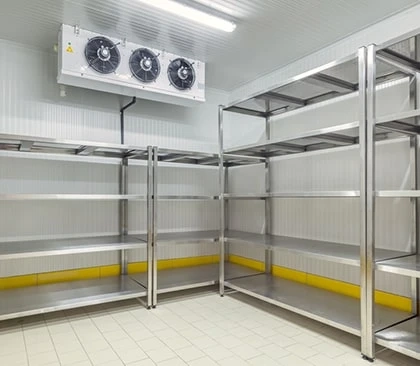Introduction
Cold rooms and refrigeration systems are vital components of various industries, playing a critical role in preserving perishable goods, maintaining the freshness of food items, and ensuring the efficacy of pharmaceuticals. From large-scale storage facilities to small commercial setups, cold rooms, and refrigeration units are indispensable for businesses dealing with temperature-sensitive products. In this blog, we will explore the significance of cold rooms and refrigeration, their applications, and the latest advancements in cooling technology to achieve optimal efficiency and sustainability.
Understanding Cold Rooms
Cold rooms, also known as walk-in refrigerators or freezers, are controlled environments designed to maintain specific low temperatures, typically ranging from -18°C to 4°C for refrigerators and -40°C to -20°C for freezers. These insulated rooms are equipped with cooling systems that allow businesses to store large quantities of perishable items safely. Common industries that rely on cold rooms include food and beverage, pharmaceuticals, hospitality, and agriculture.
The Importance of Refrigeration Systems
Refrigeration systems serve as the backbone of cold rooms, providing the necessary cooling mechanism to regulate temperatures effectively. These systems work on the principle of heat transfer, where heat is extracted from the interior of the cold room and released outside. Without refrigeration, maintaining low temperatures for extended periods would be practically impossible, leading to rapid spoilage and deterioration of goods.
Applications of Cold Rooms & Refrigeration
Food Industry: In the food industry, cold rooms are indispensable for storing perishable goods like fruits, vegetables, dairy products, meat, and seafood. These rooms prevent bacterial growth and maintain the nutritional value and freshness of the items. Pharmaceutical Industry: Temperature-sensitive medications and vaccines require precise storage conditions to maintain their efficacy. Cold rooms play a vital role in preserving pharmaceutical products, ensuring they remain potent until they reach the end-users. Hospitality & Catering: Restaurants, hotels, and catering businesses utilize cold rooms to store food supplies in bulk, facilitating efficient inventory management and reducing waste. Horticulture: Cold rooms are crucial for florists and horticultural businesses to preserve the quality and extend the shelf life of cut flowers, potted plants, and bulbs. Research & Laboratories: Many research facilities and laboratories depend on cold rooms for storing various samples and specimens that require low-temperature environments.The Need for Energy Efficiency
As concerns about environmental sustainability rise, the demand for energy-efficient cold rooms and refrigeration systems grows exponentially. Traditional refrigeration units can be energy-intensive and contribute to greenhouse gas emissions. Consequently, manufacturers and businesses are exploring more eco-friendly alternatives.
Advancements in Cooling Technology
LED Lighting: Cold rooms equipped with LED lighting offer several advantages, including lower heat output, increased energy efficiency, and longer lifespan compared to conventional lighting options. Variable Speed Compressors: Variable speed compressors in refrigeration systems allow the cooling capacity to adjust according to demand. By matching the cooling output to the actual requirements, energy wastage is minimized, leading to significant energy savings. Natural Refrigerants: Traditional refrigerants like hydrochlorofluorocarbons (HCFCs) and hydrofluorocarbons (HFCs) have a high global warming potential. Natural refrigerants such as ammonia, carbon dioxide, and hydrocarbons are gaining popularity due to their low environmental impact. Smart Controls: Incorporating smart controls and IoT technology into cold rooms enables real-time monitoring and remote management, optimizing energy usage and temperature regulation.Maintaining Cold Rooms for Longevity
Regular maintenance is crucial to ensure the longevity and efficiency of cold rooms and refrigeration systems. Routine inspections, cleaning, and timely repairs help prevent breakdowns and minimize energy wastage.
Conclusion
Cold rooms and refrigeration systems have revolutionized various industries by enabling the safe and efficient storage of temperature-sensitive goods. As technology continues to advance, the focus on energy efficiency and sustainability in cooling solutions becomes more prominent. By embracing eco-friendly refrigeration methods and adopting innovative cooling technologies, businesses can contribute to a greener future while ensuring the integrity of their products. Investing in high-quality cold rooms and refrigeration units not only benefits businesses but also plays a pivotal role in conserving resources and protecting the environment for generations to come.


